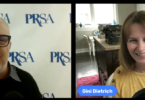In the early summer of 2020, I decided to resign from my position as head of communications at a medical-research institute in San Diego. It was a well-paid, full-time position with great benefits. I loved the organization and admired the team of professionals with whom I worked, in an industry that benefits human health.
Yet, I had been unhappy with the job’s lack of flexibility and professional development opportunities. So in the middle of a global pandemic, I called it quits and left San Diego.
People told me I was crazy. Who leaves a full-time job in one of America’s most beautiful and popular cities when many people are losing their livelihoods?
But when I informed my boss that I was leaving, she was gracious and said she understood my reasons. Many people had been reevaluating their lives and careers since the start of the pandemic, she said. Still, I saw few friends or peers risking their job security and benefits to pursue a dream of independence and flexibility. Was I too optimistic, or a little bit crazy, after all?
The truth is that I had been thinking of leaving the corporate world and starting my own firm long before the pandemic hit. But for me, the question had always been: When is the best time to start my own business?
Contrary to what some people might consider common sense, I thought that becoming my own boss during an economic downturn might be a good idea. I knew potential clients were unlikely to expand their in-house communications and marketing teams during a pandemic. And as the COVID-19 crisis worsened, the organizations that I planned to pursue as clients saw their communications needs increase.
A few months after, by late summer 2020, I had a business plan, company name, website, business cards and list of potential clients. My years of experience working in business development and client acquisition at global PR agencies would serve me well over the coming months.
It’s now been a little more than six months since I founded my firm, Waypoints Communications. Business is going well. I have a roster of clients from around the globe. The work is rewarding and interesting. Most important, I can work from anywhere in the world, choose clients that fit my interests and avoid internal corporate politics.
The experience has been a dream come true for me, but it easily could have turned into a nightmare. The reason it didn’t, I believe, is that I had been planning this step for years. I watched startups fail and talked to peers who became consultants for a few weeks, only to return to full-time positions.
Others successfully transitioned into entrepreneurship. I analyzed what distinguished them from those who had failed. Here are 10 things I learned, which I took to heart when I started my own firm:
• Have enough money to fund your lifestyle and business expenses for at least one year. It may take several months for profits to materialize. If you don’t have enough funds to cover at least one year, then don’t quit your job yet.
• Don’t start a “full service” agency that attempts to offer everything to everyone. Find a niche and stick with it.
• Do one thing better than anyone else. Once you’ve chosen your niche, learn as much about it as you can.
• Strategically decide where to register your company and where to live. Staying in a state (or country) with high tax rates and a high cost of living will erode your savings and profits.
• Don’t spend too much time or money on your website. Unless web design is a service you plan to offer, keep your own site brief and simple. You’re unlikely to get business through your website, so focus on social media such as LinkedIn and Twitter instead.
• Be stingy with expenses. Even if you have enough money for a year, always ask yourself: Is this expense really necessary? Will it improve my chances of landing clients in the near future? Wait until you’ve started earning consistent money to consider making long-term purchases.
• Don’t hire anyone for at least a year. It takes time to become comfortable as a business owner and to cultivate a reputation and client base. Once you have enough business to pay for a full-time-equivalent employee plus fringe costs, make a hire.
• Build relationships that can turn into business opportunities by reaching out to former employers and colleagues. Let them know you’ve started your own firm and the services you offer. Post the news on LinkedIn. If there is a need for your services, then someone will contact you. That’s how I got my first few clients.
• Join business and industry associations. Pitch yourself as an expert. Offer to join or moderate panel discussions and to contribute to association newsletters. These member organizations can put you in front of potential clients.
• Think internationally. Most of my clients are in the United States, but my company is registered in the Netherlands, where I spend most of my time.
Starting my own PR firm was the best career move I’ve ever made. But it’s only working out because I spent a lot of time planning my business beforehand. I also had the advantage of knowing exactly what I wanted to offer. Success requires us to be bold and to learn from others who have succeeded — and, perhaps more important, from those who have failed.
Most new PR entrepreneurs fail because they don’t plan sufficiently, they lack adequate funds, or they’re desperate and try to offer everything to everyone. But if you plan meticulously, then I’m sure entrepreneurship will be as exciting and fulfilling for you as it has been for me.
Patrick Bartosch is founder and president of Waypoints Communications, a consultancy focused on thought leadership, content strategy and crisis communications. Find him on Twitter at @PBartosch_Media.
[Photo credit: pressmaster]






